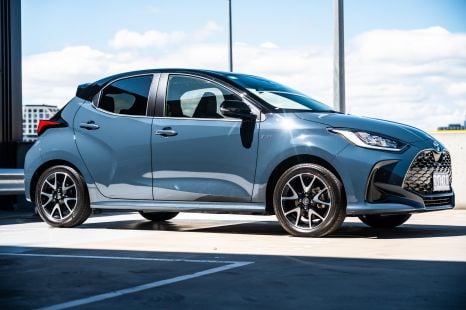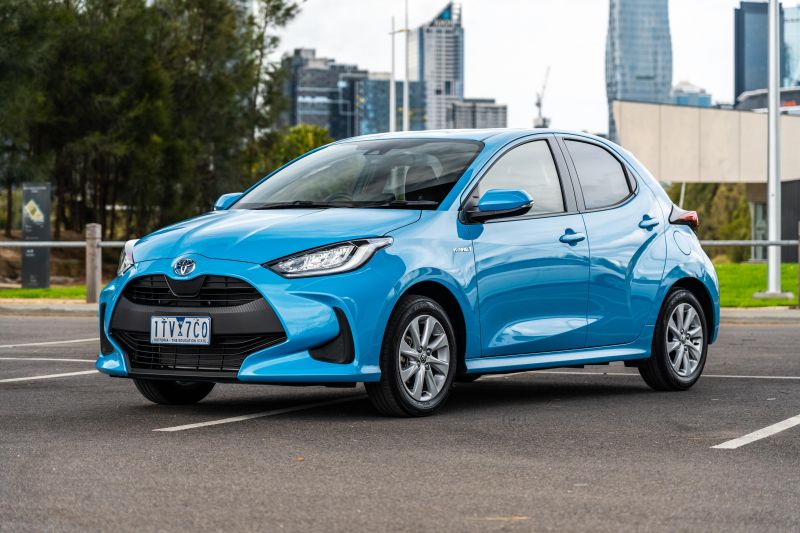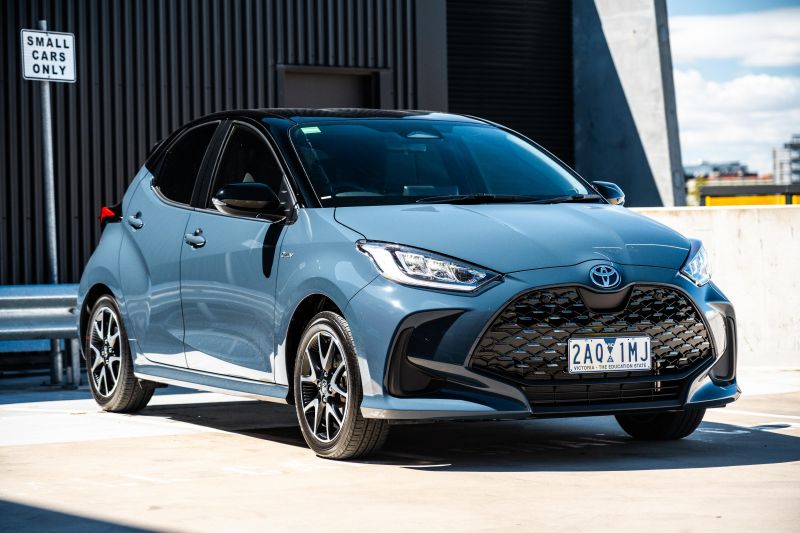

William Stopford
3 Months Ago
The Toyota Yaris was once known as one of Australia’s most affordable cars, but that is now a distant memory. With the current model now around five years old, when the current generation launched in 2020, it arrived with significant price increases compared to its predecessor, marking a shift in its positioning. For the first time, even the base model Yaris came with a price tag that no longer started with a "1."
This price increase was in part due to the much higher safety requirements for the vehicle to achieve a good rating.
As such, the Yaris introduced notable features, including a comprehensive safety suite and Australia's first hybrid option for the model. However, these strengths have not been enough to restore the Yaris to its former top-seller status in the segment.
The hybrid drivetrain, one of the car's standout features, makes the Yaris one of the most fuel-efficient vehicles available today, with a claimed combined fuel consumption of just 3.3 litres per 100km.
Despite a drop in sales in the new generation, the Yaris still has its strengths. While its pricing was initially a point of contention, recent price increases among competitors mean the Yaris is no longer positioned as a premium-priced option in its class.
Quickly see how this car stacks up against its competition. Select any benchmark to see more details.
CarExpert does the hard work to get you the best price. No negotiating, no hidden costs, just expert help and real savings on your next new car.
| Configuration | Price From* |
|---|---|
| 1.5L, Automatic, 5-door Hatchback, Petrol, FWD | $25,880 |
| 1.5L, Automatic, 5-door Hatchback, Petrol, FWD | $28,500 |
| 1.5L, Automatic, 5-door Hatchback, Petrol, FWD | $28,990 |
| Configuration | Price From* |
|---|---|
| 1.5L, Automatic, 5-door Hatchback, Petrol, FWD | $29,960 |
| 1.5L, Automatic, 5-door Hatchback, Petrol, FWD | $31,960 |
| 1.5L, Automatic, 5-door Hatchback, Petrol, FWD | $32,390 |
| Configuration | Price From* |
|---|---|
| 1.5L, Automatic, 5-door Hatchback, Petrol, FWD | $32,530 |
| 1.5L, Automatic, 5-door Hatchback, Petrol, FWD | $34,530 |
| 1.5L, Automatic, 5-door Hatchback, Petrol, FWD | $34,590 |
CarExpert does the hard work to get you the best price. No negotiating, no hidden costs, just expert help and real savings on your next new car.
See our comprehensive details for the Toyota Yaris
The Yaris quotes a boot capacity of 270 litres, which is more than most versions of the Corolla Hatch but also outdone by the bulk of segment rival
CarExpert does the hard work to get you the best price. No negotiating, no hidden costs, just expert help and real savings on your next new car.
CarExpert High Resolution Photos of the Toyota Yaris



While the interior of the Yaris may not be as visually striking as its exterior, it remains functional and practical. Toyota has maintained a sense of familiarity in the cabin, featuring a traditional shifter design, an old-school striped seat fabric pattern, and common Toyota buttons and switchgear. The SX model adopts a predominantly black and grey colour scheme, which may be more appealing to some compared to the brown leatherette found in higher-spec versions of the Yaris Cross.
Partially digital instruments and a high-mounted touchscreen help modernise the cabin, though the overall design remains relatively simple, in line with Toyota’s appeal to a broad demographic. Despite the Yaris historically being associated with a youthful image, the interior leans towards a more understated and functional style.
For drivers who typically travel solo, the front cabin offers ample space, with the tall roofline and large front windows creating an airy and open feel. The seats provide good comfort, and the touchpoints, including the leather-trimmed steering wheel and sturdy gearshift and handbrake handles, feel well-crafted for the segment. However, the overall interior does not exude the premium feel found in competitors like the Volkswagen Polo. While the dashboard features soft-touch materials, the door inserts consist of hard plastics and lower-quality materials that may seem out of place given the Yaris's higher price point.
Rear passenger space in the Yaris is somewhat limited compared to competitors like the Kia Rio and Volkswagen Polo. Headroom is adequate, but knee room can be tight, especially for taller passengers. A 6'1" individual may find extended rear seating uncomfortable, particularly behind a taller driver. However, children should find the space sufficient, and the rear seats are equipped with ISOFIX anchors and top-tether points for child seats.
Storage in the rear is minimal, with bottle holders in the doors, and the boot offers a capacity of 270 litres. While this surpasses some versions of the Corolla Hatch, it falls short of many rivals in the segment. It is noteworthy that the related Yaris Cross, despite sharing a platform and similar dimensions, offers a significantly larger boot capacity of 390 litres. For those who require more rear seat and boot space, the Yaris Cross may be a better option. A space-saver spare wheel is located beneath the boot floor.
Toyota's infotainment system, although often criticised for its simplicity and dated graphics, performs reliably. The 7.0-inch touchscreen includes a full suite of features, such as satellite navigation, wired Apple CarPlay and Android Auto, and DAB radio, though it lacks Toyota Connected Services. While the graphics and load times may not be the most advanced in the segment, the system is straightforward and effective for a broad range of users.
There are 2 different fuel economy figures for the Toyota Yaris
The most fuel efficient Toyota Yaris is the ASCENT SPORT with a 1-speed Automatic which is powered by a 1.5L GASOLINE DIRECT INJECTION & MULTI-POINT and uses 3.3L of unleaded per 100km on the combined cycle.
| Toyota Yaris | Fuel Type | Combined |
|---|---|---|
| 1.5L, Automatic, 5-door Hatchback, Petrol, FWD | Unleaded | 4.9 L/100km |
| 1.5L, Automatic, 5-door Hatchback, Petrol, FWD | Unleaded | 3.3 L/100km |
What are the running and servicing costs of a Toyota Yaris?
Toyota backs the Yaris with a five-year, unlimited-kilometre warranty.
It offers capped-price servicing for the first five years or 75,000km, whichever comes first.
Servicing is required every 12 months or 15,000km, with each visit capped at $245.
Our expert take on Toyota Yaris drivability.
As seen in other Toyota models, the brand's TNGA platform has transformed the previously unremarkable Yaris into a more engaging drive. With responsive, fluid steering and a sharp front end, the Yaris navigates city streets and car parks with ease, providing a comfortable and nimble experience.
The TNGA platform brings a sense of maturity and refinement to the Yaris's ride and handling, making it well-suited for daily commuting, including a mix of city and highway driving. The standout powertrain in the range is the 1.5-litre hybrid system, offering exceptional efficiency—achieving as low as 3.6L/100km in testing—while the additional torque from the electric motor provides a noticeable boost during acceleration.
The transition between the petrol engine and electric motor is almost seamless, though the typical vibrations of the three-cylinder engine can be felt when the petrol motor activates. While the engine can be a bit noisy compared to European competitors, its distinctive sound is still more pleasant than some of Toyota’s four-cylinder Atkinson-Cycle units. The Yaris benefits from a more energy-dense lithium-ion battery, allowing it to rely more on its electrified components for improved electric vehicle (EV) range and performance, reaching speeds of up to 40km/h in EV mode.
Although the Yaris represents a significant improvement over its predecessor, it faces increasing competition as more rivals are updated and refined. It lacks the turbocharged performance of the Volkswagen Polo and higher-spec versions of the Kia Rio and Suzuki Swift. Dynamically, it doesn't represent a significant leap over older models like the Mazda 2, despite its more recent design.
One advantage of the Yaris is its comprehensive suite of driver assistance systems, which come standard across the range. These include adaptive cruise control, Lane Trace Assist, lane departure warning, lane-keep assist, and traffic sign recognition. However, blind-spot monitoring and rear cross-traffic alert are only available in the top-spec ZR model, while the mid-tier SX grade offers LED headlights, a step up from the base Ascent Sport.
What is the warranty on a Toyota Yaris?
The Toyota Yaris offers a 5 year unlimited km warranty. This is separate to the warranty on offer under Australian Consumer Law which can be greater for certain parts based on what is deemed as a reasonable period of time.
CarExpert does the hard work to get you the best price. No negotiating, no hidden costs, just expert help and real savings on your next new car.
The cheapest Toyota Yaris is the ASCENT SPORT that starts from $25,880.
The most expensive Toyota Yaris is the ZR that starts from $34,590.
The best towing capacity of a Toyota Yaris is null kg offered by the following variants: ASCENT SPORT, SX and ZR.
The largest Toyota Yaris is the ASCENT SPORT which measures 1695mm wide, 3940mm in length and sits 1505mm tall.
The most powerful Toyota Yaris is the ASCENT SPORT which has 88kW of power from its 1.5L PETROL DIRECT INJECTION engine.
The Toyota Yaris is built in Japan and shipped to Australia.
The heaviest Toyota Yaris is the ZR which weighs 1520 kg (kerb weight).
The Toyota Yaris uses unleaded.